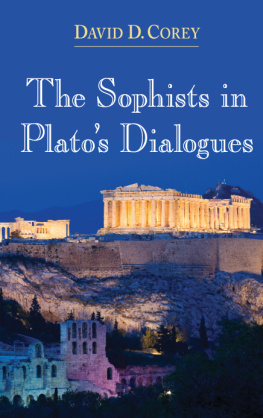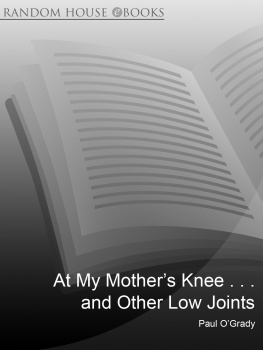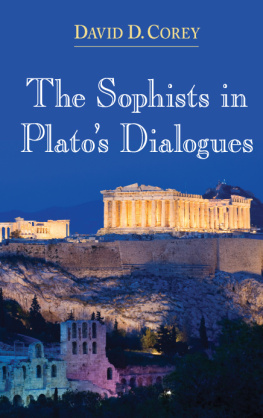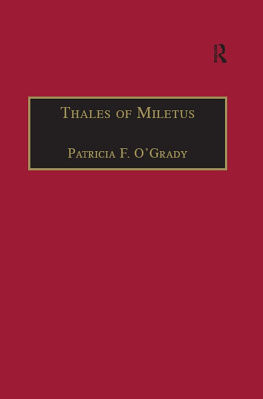Patricia F. OGrady - The Sophists: An Introduction
Here you can read online Patricia F. OGrady - The Sophists: An Introduction full text of the book (entire story) in english for free. Download pdf and epub, get meaning, cover and reviews about this ebook. City: London, year: 2013, publisher: Bloomsbury Academic, genre: Romance novel. Description of the work, (preface) as well as reviews are available. Best literature library LitArk.com created for fans of good reading and offers a wide selection of genres:
Romance novel
Science fiction
Adventure
Detective
Science
History
Home and family
Prose
Art
Politics
Computer
Non-fiction
Religion
Business
Children
Humor
Choose a favorite category and find really read worthwhile books. Enjoy immersion in the world of imagination, feel the emotions of the characters or learn something new for yourself, make an fascinating discovery.

- Book:The Sophists: An Introduction
- Author:
- Publisher:Bloomsbury Academic
- Genre:
- Year:2013
- City:London
- Rating:3 / 5
- Favourites:Add to favourites
- Your mark:
- 60
- 1
- 2
- 3
- 4
- 5
The Sophists: An Introduction: summary, description and annotation
We offer to read an annotation, description, summary or preface (depends on what the author of the book "The Sophists: An Introduction" wrote himself). If you haven't found the necessary information about the book — write in the comments, we will try to find it.
The Sophists: An Introduction — read online for free the complete book (whole text) full work
Below is the text of the book, divided by pages. System saving the place of the last page read, allows you to conveniently read the book "The Sophists: An Introduction" online for free, without having to search again every time where you left off. Put a bookmark, and you can go to the page where you finished reading at any time.
Font size:
Interval:
Bookmark:
THE SOPHISTS
An Introduction
Edited by
Patricia OGrady

Bloomsbury Academic
An imprint of Bloomsbury Publishing Plc
50 Bedford Square | 1385 Broadway |
London | New York |
WC1B 3DP | NY 10018 |
UK | USA |
www.bloomsbury.com
Bloomsbury is a registered trade mark of Bloomsbury Publishing Plc
First published in 2008 by Gerald Duckworth & Co. Ltd.
Editorial arrangement Patricia OGrady 2008
Patricia OGrady has asserted her right under the Copyright, Designs and Patents Act,
1988, to be identified as Editor of this work.
All rights reserved. No part of this publication may be reproduced or transmitted in any
form or by any means, electronic or mechanical, including photocopying, recording, or
any information storage or retrieval system, without prior permission in writing from
the publishers.
No responsibility for loss caused to any individual or organization acting on or refraining
from action as a result of the material in this publication can be accepted by Bloomsbury
or the author.
British Library Cataloguing-in-Publication Data
A catalogue record for this book is available from the British Library.
eISBN-13: 978-1-4725-2120-0
Library of Congress Cataloging-in-Publication Data
A catalog record for this book is available from the Library of Congress.
To Mary Skaltsas,
dear friend,
ever supportive and encouraging.
Doug Al-Maini is Professor, Department of Philosophy, St Francis Xavier University, Canada.
George Arabatzis is Research Associate, Research Centre on Greek Philosophy, Academy of Athens, Greece.
Dirk Baltzly is Senior Lecturer, School of Philosophy, Monash University, Australia.
Bevin Boden is Technical Support Officer, Flinders University, Australia.
Geoff Bowe is Assistant Professor, Philosophy, History and Politics, Thompson Rivers University, Canada.
Craig Cooper is Professor of Classics, University of Winnipeg, Canada.
Trevor Curnow is Reader in Philosophy, University of Cumbria, UK.
Sabatino DiBernardo is Instructor in Religion, Philosophy and Humanities, University of Central Florida, USA.
Christine Farmer is Writer and Illustrator, University of Birmingham, UK.
Louis Groarke is Associate Professor, Department of Philosophy, St Francis Xavier University, Canada.
Paul Groarke is Assistant Professor, Department of Criminology and Criminal Justice, St Thomas University, Canada.
Colin Higgins is Instructor in English, University of Louisiana Lafayette, USA.
Jonathan Lavery is Assistant Professor, Philosophy and Contemporary Studies, Wilfrid Laurier University, Canada.
Patricia OGrady is Adjunct Research Associate, Department of Philosophy, Flinders University, Australia.
Glenn Rawson is Assistant Professor of Philosophy, Rhode Island College, USA.
Steven R. Robinson is Associate Professor and Chair, Philosophy Department, Brandon University, Canada.
Andrew Shortridge is Tutor, School of Philosophy and Bioethics, Monash University, Australia.
Daniel Silvermintz is Assistant Professor of Humanities, University of Houston-Clear Lake, USA.
Seamus Sweeney is Special Lecturer and Senior Registrar in Psychiatry, St Vincents University Hospital/University College, Dublin, Ireland.
It is with pleasure that I acknowledge friends and associates for their ongoing assistance and advice. I am grateful to Rodney Allen, Allan Chalmers and Ian Ravenscroft for advice in a number of areas and for each reading one or more of my chapters and offering suggestions for improvement and clarification. I especially thank Daniel Silvermintz for researching and writing a first-rate chapter, The Double Arguments, at short notice. My thanks to George Couvalis for wise advice, to Michael Tsianikas, George Frazis, Maria Palaktsoglou of the Modern Greek Section of the Department of Languages at Flinders University for continued support, to Suzanne Roux for her interest and loyalty, and to the ever-patient administrative assistants, Julie Elkson, Lis Jansson, Mary Skaltsas and Maureen Taylor. My thanks to the library staff of Flinders University for whom no query was too difficult, and to Bevin Boden, Technical Support Officer, also of Flinders University for unravelling the mysteries of contrary computers. A special thank you to my loyal family.
Special thanks, also, to Deborah Blake, Editorial Director at Duckworth, for patience and understanding.
I am grateful to the Flinders University of South Australia for providing the necessary resources which enabled me to embark on this project. Without that support this book would not have come to fruition.
Sincere thanks to all the contributors, those dedicated scholars of the philosophy of ancient Greece, for their valuable, thought-provoking work, often slotted in between the demands of teaching, marking, administrative duties and family crises.
Thank you, everyone, for making another dream come true.
Patricia OGrady
The impetus for this book came from the realisation that there is no available book on the sophists written in a straightforward uncomplicated style suitable for students and non-specialists studying fifth- to fourth-century BC Greece. Study of the politics, society and education of Athens in the fifth to fourth century would be shallow and incomplete without knowledge and understanding of the sophists.
This book is an introduction to certain unique individuals who influenced the political and social structure of Greece, particularly Athens, to such a marked degree that they stand out from the traditional more general category of sophists (wise men, poets and teachers), becoming a topic of study on their own account.
The period under discussion was vibrant with activity in literature, architecture, music, poetry, sculpture, politics, and philosophy. At the same time the Athenian empire was being established and expanded. We know of many notable and talented men, and a few women, from this time. We hear of the playwrights Aeschylus, Euripides and Aristophanes, of the philosophers Anaxagoras, Socrates and Democritus, of the politicians Aristides, Cimon, Themistocles, Alcibiades, Pericles and his mistress, perhaps wife, Aspasia, to mention just a few of the outstanding figures of the time. Plato was born in about 429 and Xenophon a year or two later; they both attained distinction early in the following century. Glorification of Athens following destruction during the Persian Wars was under way: construction of the Parthenon began in 447, directed by the brilliant architect Ictinus and the sculptor Phidias. And we add to this illustrious list the names of the sophists who form the subjects of this book.
Our story of the sophists commences in about 450, when Athenians were still basking in the euphoria of their victory over the Persians, almost to a point of hubris. The first chapter is devoted to defining the word sophist, and shows how, in the literature and orally, and especially in the works of playwrights, it became a derogatory term, a usage which it retains, to some extent, to this day.
The worlds most famous democracy was evolving, and the theatre and the market place became important meeting places for conversation and debate, just as in the courts and the assembly.
Next pageFont size:
Interval:
Bookmark:
Similar books «The Sophists: An Introduction»
Look at similar books to The Sophists: An Introduction. We have selected literature similar in name and meaning in the hope of providing readers with more options to find new, interesting, not yet read works.
Discussion, reviews of the book The Sophists: An Introduction and just readers' own opinions. Leave your comments, write what you think about the work, its meaning or the main characters. Specify what exactly you liked and what you didn't like, and why you think so.







